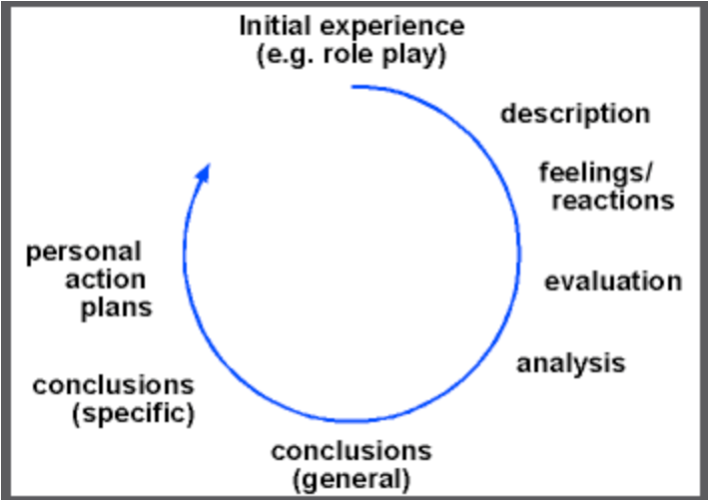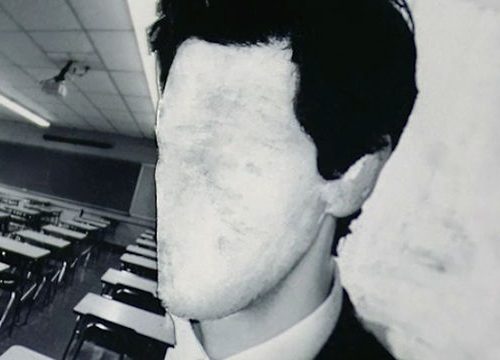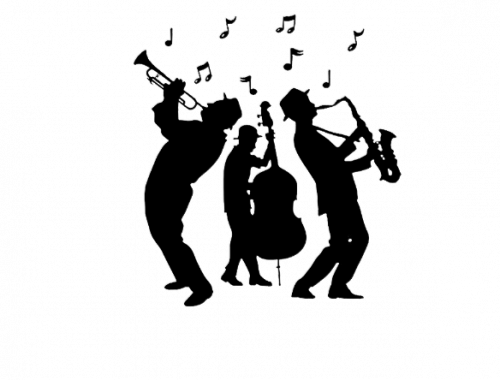Breaking into the Scene
As our work-based learning journeys and adjoining placements come to end, I’d like to use this blog post to reflect on the challenges of self-confidence and promotion within the radio and music industry. I will use Gibbs’ model of reflection to explore thoughts and feelings of my experience, to analyse my behaviour and to think about my future within the industry.

Description
The term “breaking into the scene” is thrown around in many industries, but it seems to be particularly common within music and the media. At this point in my placement at Q Radio, I have obtained an abundance of technical, musical and personal skills. I have produced over twenty broadcast quality radio idents including introductions, promotions, cues and links; Two of my most recent idents were used on air for promoting St Patrick’s Day. I have transferred the skills that I have been taught in making these to create my own “Queen’s Radio” branded versions, with my own voiceovers being used for many of them. I have worked to the best of my abilities to impress with my technical and producing skills, but I have ignored presenting my work and abilities to others within both Q Radio, Queen’s Radio and beyond.
Feelings
I would be exaggerating if I said I was excited to hear my work on air. I helped the Head of Music place both idents into the schedule myself the day prior and knew exactly when to listen in. I had made a few idents for Christmas and was told that they were put into a bank for the Head of Music to use if he wanted. I was never told when exactly they would be played on air as I had been this time, or heard them on air myself, so I don’t think they were used. When it came down to the first play on St Patrick’s Day morning, I was quickly flooded with embarrassment following the responses I was met with from family and friends.
Evaluation
The positive element of this experience was obviously having my work played live on air. Creating the various idents throughout the year has been extremely enjoyable for me. I find pleasure in being able to merge skills that I’ve learned from my course modules (such as editing, creative and corrective audio processing, songwriting) to produce something that’s useful or meaningful to other people; Many of the presenters that I have created idents for have loved how the end product sounded whether it ended up going to air or not. I have gained and built upon all of these technical skills over my time at Queen’s but have never had a “real” purpose or scenario to use them in until this year.
The negative comments that I received following the on-air play ruined the experience for me. Many of my friends or family members that I had told missed the live plays and asked me to send a recording through to them. Most of them reacted in a very positive manner but there were also a few “Is that it?”, “That was very short, could you not have made it longer?” or my favourite, “Is that all you do?”.
“The trick is not caring about what everyone thinks of you and just caring about what the right people think of you.”
– Brian Michael Bendis
Analysis
After experiencing such hurtful comments from people who I thought would be supportive of my work, I couldn’t focus on the positives of the situation. I realised that many of the people closest to me didn’t understand what my degree is, what my placement at Q Radio involves or why I want to work in this industry. It is partly my own responsibility that they don’t understand this, but this experience has made it clear to me that there’s still a huge stigma around careers in the arts and media.
In secondary school, I was pushed towards studying medicine, and going to study music was considered a “waste of my abilities”. A great deal of the general population still holds the opinion that a career in the media, broadcast and production industry is easy or “dossy”, when it most certainly isn’t the case.
Getting my work played on the third largest commercial radio station in Northern Ireland (Rajar Quarterly Listening Report, 2021) is a huge achievement and one that I should be proud of myself for. I have spent hours honing my critical listening, editing, writing and research skills to be able to create idents that are suitable to be played on air and are of broadcast standard. Ignoring close ones’ views or opinions is challenging, especially when they appear to hold my work and achievements in such a low regard. After chatting to other members of the Q team such as journalists, presenters and my two production supervisors, I have realised that although I do value my friends and family opinions, they are not the people that I should be worried about impressing (Gregory et al., 2007) (Barton, 2016).
Conclusion
I have impressed my supervisors with my work, and they believe my recording, editing, mixing and mastering work is of a high standard, which is all that really matters. The perfectionist side of me ensures that my work is of a high standard, but I need to work on being less self-critical and self-doubting in my abilities. The often uncomfortable “water-cooler” conversations that I dread within the industry aren’t as bad as they seem and almost all experience the same stigma and awkwardness that I do.
Action Plan
In future, I need to have confidence in my work, be assertive in work situations and build upon my self-promotion skills. I often find it difficult to talk about my work and passions, but I now recognise that I can be “loud and proud” about what I do without being egotistical (Barton, 2016). Networking and building upon my professional relationships will be my key to eventually breaking into the scene.
Bibliography
Barton, G., 2016. Don’t Get a Job… Make a Job. [ebook] London: Laurence King, pp.17-25, 89, 118. Available at: <https://queens.ezp1.qub.ac.uk/login?url=https://search.ebscohost.com/login.aspx?direct=true&db=nlebk&AN=1234840&site=eds-live&scope=site&custid=ns022249&profile=cat_eds> [Accessed 18 March 2022].
Gibbs, G., 2013. Learning by Doing: a guide to teaching and learning methods. 1st ed. [ebook] Oxford: Oxford Brookes University, pp.78-90. Available at: <https://shop.brookes.ac.uk/product-catalogue/oxford-centre-for-staff-learning-development/books-publications/ebooks/learning-by-doing-a-guide-to-teaching-and-learning-methods-by-graham-gibbs-ebook> [Accessed 20 March 2022].
Gregory, G., Healy, R. and Mazierska, E., 2007. Careers in media and film: the essential guide. [ebook] Los Angeles: Sage, pp.51-59. Available at: <https://queens.ezp1.qub.ac.uk/login?url=http://site.ebrary.com/lib/queensbelfast/Doc?id=10285202%20%20> [Accessed 19 March 2022].
Hanes, S., 2016. Break into the Scene: A Musician’s Guide to Making Connections, Creating Opportunities, and Launching a Career. Place of Publication Not Identified.
Lugea, J., 2021. Communicating in the Workplace.
Lugea, J. and McGinnis, L., 2021. Reflective Practice: The Reflective Blogs.
Rajar. 2021. Quarterly Listening Figures. [online] Available at: <https://www.rajar.co.uk/listening/quarterly_listening.php> [Accessed 23 March 2022].
Art Assistant to Sandwich Maker…
You May Also Like

The Equity Of Detachment
25 March 2022
An Experience Never To Forget
1 April 2022
